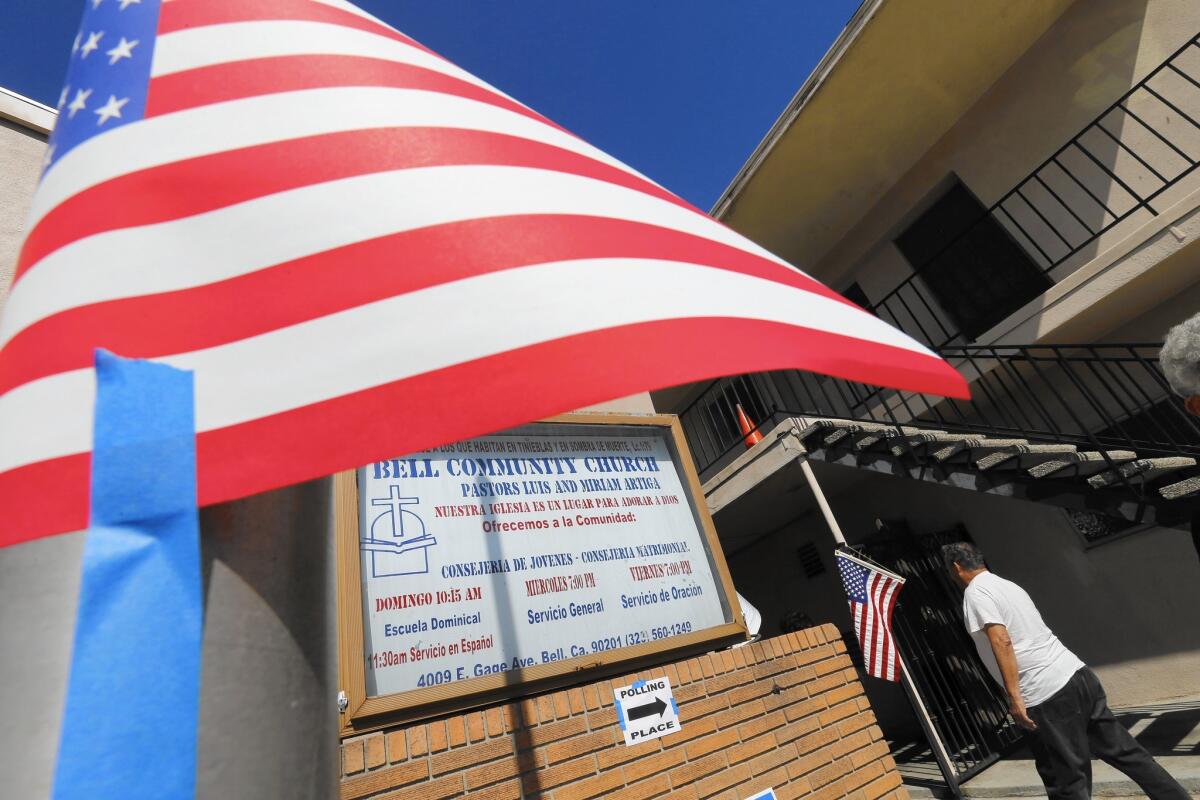State high court set to hear arguments on Citizens United advisory measure

- Share via
reporting from SAN FRANCISCO — California legislators decided last year to ask voters whether they supported overturning a landmark ruling that allowed unlimited corporate spending to support or denounce federal candidates.
A conservative taxpayers group balked, arguing that state legislators lack the power to put advisory measures on the ballot. The California Supreme Court agreed to remove Proposition 49 and to decide in a later ruling whether it could go forward in a future election.
The court will hear arguments on the case Tuesday, generally the last step before issuing a decision. If the Legislature wins, Californians will be able to cast an advisory vote next year on whether Citizens United, a 2010 U.S. Supreme Court decision that overturned campaign spending laws, should be repealed by a federal constitutional amendment.
Some scholars see the case as an important test of the separation of powers. Lawyers for the Legislature point out that no specific provision in the California Constitution prohibits legislators from placing advisory measures on the ballot.
Cities and counties often sponsor advisory measures, and the Legislature placed some on the ballot decades ago. More than a dozen other states also allow lawmakers to put nonbinding measures on the ballot.
At the same time, no provision in the state Constitution authorizes the Legislature to sponsor such measures, and citizens are prohibited from offering them by initiative. The Howard Jarvis Taxpayers Assn., which has been trying to keep the matter off the ballot, argues the measure was a ploy to increase liberal turnout at an election.
UC Irvine Professor Richard L. Hasen, an expert in election law, said there was “great value” in allowing voters to express disapproval of a controversial U.S. Supreme Court decision.
“On the other hand I worry about gaming the system and cluttering the ballot,” Hasen said. “It is a hard question.”
The bill authorizing Proposition 49, the ballot measure, became law without Gov. Jerry Brown’s signature. Brown said at the time that lawmakers should not “clutter” the ballot with nonbinding propositions.
The justices will have 90 days after Tuesday’s argument to decide whether voters may consider the measure in the November 2016 presidential election.
The 9 a.m. hearing will be broadcast live on the California Channel and streamed on its website.
Chief Justice Tani Cantil-Sakauye, appointed by former Gov. Arnold Schwarzenegger, was the only member of the state high court last year who favored putting the proposition on the ballot while the justices considered its validity.
“I do not see such a clear showing that the Legislature lacks authority to place the measure before the voters, warranting this court taking the extraordinary step of removing the measure from the ballot, thereby disenfranchising the voters,” she wrote.
Justice Goodwin Liu, appointed by Gov. Jerry Brown, wrote separately to express concern about the Legislature using the ballot for an “opinion poll.”
In Citizens United vs. Federal Election Commission, the conservative majority of the U.S. Supreme Court overturned precedents and ruled that corporations could spend as much as they wanted to sway voters by taking out advertisements or hiring workers to help or hurt a candidate for federal office. The ruling also has been applied to spending by unions.
The Legislature’s advisory measure would ask voters whether California should pursue a federal constitutional amendment to revoke Citizens United. The Legislature already has passed a resolution opposing the ruling.
Putting the measure on the ballot would cost about $200,000 for printing and staff time, said Fredric D. Woocher, who is representing the Legislature in the case. He said thousands of people signed petitions asking the Legislature to place the proposal before voters.
“It took the Legislature by surprise that this was challenged and the court took it off the ballot,” Woocher said.
Twitter: @mauradolan
ALSO
Metro receives average rating in statewide evaluation of rail transit stations
BLM decision set backs Cadiz plan to sell Mojave groundwater
Man killed by LAPD had thrown beer bottle through police car window, chief says
More to Read
Sign up for Essential California
The most important California stories and recommendations in your inbox every morning.
You may occasionally receive promotional content from the Los Angeles Times.














